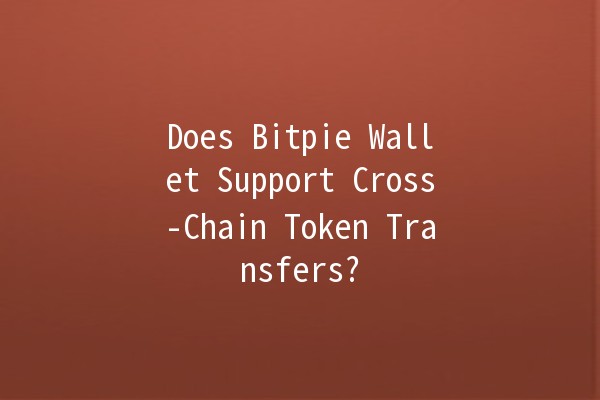
In recent years, cryptocurrencies have gained significant popularity, leading to the development of numerous wallets designed to store and manage various digital assets. Among these wallets, Bitpie stands out for its versatility and userfriendly interface. One crucial feature that many potential users inquire about is whether Bitpie Wallet supports crosschain token transfers. This article will delve into the capabilities of the Bitpie Wallet concerning crosschain transactions, explore relevant features, and provide practical tips to enhance your cryptocurrency management experience.
Understanding Bitpie Wallet
Before we jump into crosschain transfers, it’s essential to have a clear understanding of what Bitpie Wallet is and its primary features. Launched in 2017, Bitpie Wallet is a noncustodial wallet that allows users to manage multiple cryptocurrencies in one platform. Its support for various assets, security measures, and ease of use make it a favored choice among many crypto enthusiasts.
Key Features

What are CrossChain Token Transfers?
Crosschain token transfers refer to the ability to send tokens between different blockchain networks. This feature is particularly useful in the crypto ecosystem, as it allows interoperability and enhances the usability of assets across various platforms.
For instance, if you want to transfer a token from the Ethereum blockchain to the Bitcoin blockchain, a wallet with crosschain capabilities can facilitate this process without needing a centralized exchange.
Does Bitpie Wallet Support CrossChain Transfers?
As of now, Bitpie Wallet does not natively support crosschain token transfers. However, it allows users to manage multiple cryptocurrencies within the wallet ecosystem. To transfer tokens across different chains, users often have to rely on thirdparty services, such as decentralized exchanges (DEXs) or crosschain bridges.
ThirdParty Solutions for CrossChain Transfers
Example: A user can utilize a bridge service to transfer an Ethereumbased token to a Binance Smart Chain token by locking their Ethereum tokens in the bridge and receiving an equivalent amount of the new token on the Binance Smart Chain.
Example: A user can use DEXs like Uniswap for Ethereum tokens and PancakeSwap for Binance Smart Chain tokens to execute crosschain swaps.
Example: If two users wish to swap Bitcoin for Litecoin directly, they can utilize an atomic swap smart contract to facilitate the trade securely.
Enhancing Your Cryptocurrency Management
While Bitpie Wallet may not directly handle crosschain transfers, users can optimize their cryptocurrency management by utilizing some tools and techniques. Here are five productivity tips to enhance your experience:
When dealing with different blockchains, utilize reputable crosschain bridges. Research these services, ensuring they have a good reputation and adequate security measures in place. By properly utilizing these bridges, you can minimize risks and optimize transfer times.
Regularly update your Bitpie Wallet to the latest version. Wallet developers frequently release updates that introduce new features, optimizations, and security enhancements. Staying updated can prevent vulnerabilities that may expose your assets to potential threats.
Monitor the prices of cryptocurrencies using price tracking applications or builtin features within wallets. Set price alerts so you can be notified of any significant changes, allowing you to take timely actions in crosschain transactions if necessary.
Backing up your wallet is crucial for security. Make sure to regularly export your private keys or seed phrases and store them securely. In case of any issues, having a backup can protect your funds from being lost.
When making crosschain transactions via thirdparty services or bridges, ensure you have a clear understanding of the associated fees. Different platforms may charge varying fees based on the complexity of the transaction, and being aware of these can help you choose the most costeffective service.
Frequently Asked Questions
The primary advantage of Bitpie Wallet is its userfriendly interface combined with robust security features, enabling users to manage multiple cryptocurrencies in one easytouse platform, all while retaining control over their private keys.
Yes, Bitpie Wallet supports staking for certain cryptocurrencies. Users can stake their digital assets directly within the wallet and earn rewards over time without transferring them to external platforms.
Bitpie Wallet is available on both iOS and Android devices. The wallet also has a webbased version, allowing users to access their assets across different platforms seamlessly.
Bitpie Wallet enhances security using several features, including private key management, backup options, and a noncustodial model that ensures users remain in control of their funds without relying on thirdparty services.
Yes, utilizing thirdparty bridges or DEXs may carry risks such as smart contract vulnerabilities, potential hacks, and unreputable services. Always ensure you conduct thorough research before participating in crosschain transactions using these services.
If you lose access to your Bitpie Wallet, you can recover it using your backup seed phrase or private keys. It’s crucial to store this information securely and privately to prevent unauthorized access.
al Thoughts
While Bitpie Wallet does not currently support native crosschain token transfers, its multicurrency management features and security measures create a reliable foundation for users navigating the complex world of cryptocurrencies. By leveraging thirdparty services and following productivity tips, users can enhance their cryptocurrency management experience, ensuring their digital assets are both safe and easily accessible.
Staying informed and utilizing available tools wisely will make your journey in the cryptocurrency space not only manageable but also enjoyable.

